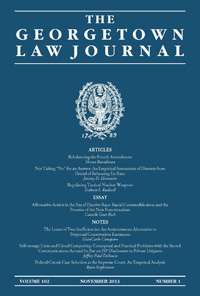The Georgetown Law Journal
The Georgetown Law Journal is a student-edited scholarly journal published at Georgetown University Law Center. It is the flagship law review of the Georgetown University Law Center.
 | |
| Discipline | Law review |
|---|---|
| Language | English |
| Publication details | |
| History | 1912 to present |
| Publisher | Georgetown University Law Center (United States) |
| Frequency | Bimonthly |
| Standard abbreviations | |
| Bluebook | Geo. L.J. |
| ISO 4 | Georget. Law J. |
| Indexing | |
| ISSN | 0016-8092 |
| Links | |
Overview
The Georgetown Law Journal is headquartered at Georgetown University Law Center in Washington, D.C. and has published more than 500 issues since its inception, as well as the widely used Annual Review of Criminal Procedure (ARCP), a comprehensive practitioner's guide to criminal procedure. The Journal is the only top law journal to consistently publish on time. As of March 2016, it was the sixth-ranked law review .[1] The Journal is currently, and always has been, run by law students.
History
Volume 1, Issue 1 was published in November 1912, under the supervision of Editor-in-Chief Eugene Quay. At the time, an annual subscription to the new Journal cost one dollar. The first article was titled “The 125th Anniversary of the Drafting of the Constitution of the United States.” In a three-paragraph statement of purpose, the editors of the new Journal proclaimed:
When a school has gathered to itself some thousand potential lawyers, its efforts in the line of literary endeavor should find some proper expression; when a law school has reached the rank to which Georgetown has attained, it should be represented by a review that would take a place as high; and when we scan the names that make up the list of Georgetown’s faculty and the roster of her alumni, we can see no room for fear but that a journal representing her would take its proper rank.
— 1 Geo. L.J. 50, 50 (1912).
Membership
Today, the Journal employs approximately 100 second- and third-year law students—about 50 in their graduating year who serve in editorial positions and 50 in intermediate years who serve as staff. The staff collect and check sources, performing technical edits and checking for typographical errors. The upperclass students are tasked with administering the Journal‘s daily operations.
In order to gain journal membership, first-year students are permitted to participate in the Write On competition after completing their final exams in the spring semester. The competition is administered by the Georgetown Law Office of Journal Administration.[2]
Students are offered positions on the Journal based on the following methods:
- Based on the student's score in the Write On competition
- Based on a combination of Write On score and first-year grades
- Based on a personal statement detailing the contribution the student will make to the Journal's diversity.
Annual Review of Criminal Procedure
The Annual Review of Criminal Procedure (ARCP) is a comprehensive, topic-by-topic summary of federal criminal procedure. The goal of the ARCP—which is written, updated, and edited by members of The Georgetown Law Journal—is to provide readers with an objective, concise, and accurate overview of criminal procedure in the federal courts.
The ARCP serves as a practical aid to a diverse readership that includes prosecutors and defense attorneys, judges and their law clerks, and prisoners assisting in their own defense or appeal. Over eleven thousand copies are distributed annually.[3] The ARCP is sold at a discount to prisoners.[4]
The ARCP includes a preface, often written by a well-regarded legal practitioner, academic, or judge. The 2012 preface was written by United States Attorney General Eric Holder.[5] The 2015 preface, written by Judge Alex Kozinski of the United States Court of Appeals for the Ninth Circuit, critiqued many aspects of the criminal justice system.[6] The United States Department of Justice published a letter responding to Judge Kozinski's preface,[7] and the dispute generated significant media coverage.[8][9]
References
- "Archived copy". Archived from the original on 2014-02-28. Retrieved 2014-02-11.CS1 maint: archived copy as title (link)
- http://www.law.georgetown.edu/academics/law-journals/index.cfm
- "Annual Review of Criminal Procedure". Georgetown Law Journal. Archived from the original on 2016-04-07. Retrieved 14 April 2016.
- "Georgetown Law Journal Annual Review of Criminal Procedure". Prison Activist Resource Center. Retrieved 14 April 2016.
- "Annual Review of Criminal Procedure 41st Edition" (PDF). Retrieved 14 April 2016.
- Kozinski, Hon. (2015). "Preface" (PDF). Georgetown Law Journal Annual Review of Criminal Procedure. 44. Archived from the original (PDF) on 2016-04-03. Retrieved 2016-04-14.
- Walsh, John; Goldsmith, Andrew. "Re: The Annual Review of Criminal Procedure" (PDF). Archived from the original (PDF) on 2016-04-17. Retrieved 14 April 2016.
- Tillman, Zoe (November 16, 2015). "Justice Department Rebuts Judge Kozinski's Criticism of Prosecutors". National Law Journal. Retrieved 14 April 2016.
- Bazelon, Emily (July 7, 2015). "The Law that Keeps People on Death Row Despite Flawed Trials". New York Times. Retrieved 14 April 2016.
